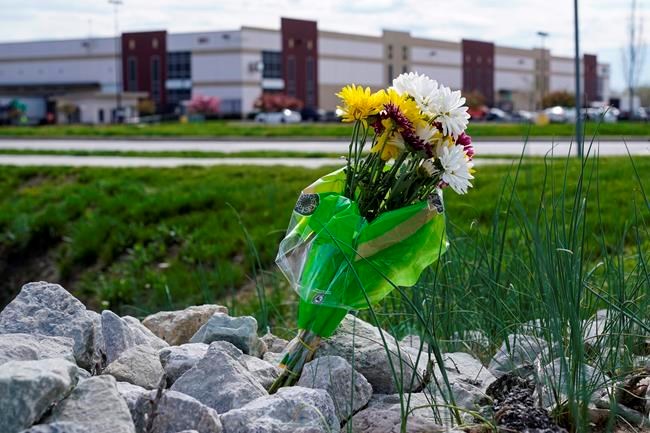INDIANAPOLIS ŌĆö A former employee who shot and killed eight people at a FedEx facility in Indianapolis never appeared before a judge for a hearing under Indiana's ŌĆ£red flagŌĆØ law, even after his mother called police last year to say her son might commit ŌĆ£suicide by cop," a prosecutor said Monday.
Marion County Prosecutor Ryan Mears said authorities did not seek such a hearing because they did not have enough time under the law's restrictions to definitively demonstrate Brandon Scott HoleŌĆÖs propensity for suicidal thoughts, something they would need to have done to convince a judge that Hole should not be allowed to possess a gun.
The ŌĆ£red flagŌĆØ legislation, passed in Indiana in 2005 and also in effect in other states, allows police or courts to seize guns from people who show warning signs of violence. Police seized a pump-action shotgun from Hole, then 18, in March 2020 after they received the call from his mother.
While recovering the shotgun, one of the responding officers also witnessed ŌĆ£white supremist
Mears said that prosecutors were limited in their ability to prepare a ŌĆ£red flagŌĆØ case against Hole following that incident due to a 2019 change in the law that requires courts to make a "good-faith effortŌĆØ to hold a hearing within 14 days. An additional amendment required them to file an affidavit with the court within 48 hours.
ŌĆ£This individual was taken and treated by medical professionals and he was cut loose,ŌĆØ and was not even prescribed any medication, Mears said. "The risk is, if we move forward with that (red flag) process and lose, we have to give that firearm back to that person. ThatŌĆÖs not something we were willing to do.ŌĆØ
Indianapolis police previously said that they never did return the shotgun to Hole. Authorities have said he used two ŌĆ£assault-styleŌĆØ rifles to gun down eight people, four of them from the cityŌĆÖs Sikh community, at the FedEx facility last Thursday before he killed himself.
Police on Monday identified the high-capacity weapons used by Hole, who was 19 at the time of the shooting. One was a Ruger AR-556 Hole purchased in September. The second was an HM
Alcohol, Tobacco and Firearms determined that Hole purchased the guns legally through authorized dealers, according to a police news release that did not name the dealers. The release also said FedEx terminated Hole in October when he failed to return to work.
A police probable cause affidavit narrative also released Monday states describes Hole's March 2020 arrest, and a request he made to his arresting officers. ŌĆ£Brandon upon being placed in handcuffs became immediately anxious and stated, ŌĆśPlease just turn the power strip off on my computer. I donŌĆÖt want anyone to see whatŌĆÖs on it,ŌĆÖŌĆØ it states, before adding that while securing the shotgun an officer saw ŌĆ£what through his training and experience indicated was white supremist
Paul Keenan, special agent in charge of the FBIŌĆÖs Indianapolis field office, said Friday that the FBI was contacted to the scene after items were found in HoleŌĆÖs bedroom but he did not elaborate on what those were. He said agents found no evidence of a crime and that they did not identify Hole as espousing a racially motivated ideology.
Republican state Sen. Erin Houchin, a sponsor of tougher provisions added to Indiana's red flag law in 2019, said in the Hole case the law ŌĆ£could have worked just as it should, but the prosecutor never pursued it.ŌĆØ
Those 2019 changes to the law made it a
But Mears said there are still problems that need to be addressed. He said he had spoken to legislators in the past about lengthening the two-week timeline for holding a red flag hearing, and he reiterated that call on Monday. Extending the time frame would give prosecutors more time to investigate a personŌĆÖs background and mental health history before going in front of a judge, he said. He added that he would also like to see the statute prohibit a person under investigation from buying a gun until the hearing is held and the judge makes a final ruling.
Mears said the red flag law is ŌĆ£a good start, but itŌĆÖs far from perfect.ŌĆØ
ŌĆ£I think people hear ŌĆśred flagŌĆÖ and they think itŌĆÖs the panacea to all these issues. ItŌĆÖs not,ŌĆØ he said.
Democratic state Rep. Ed DeLaney, a gun control advocate, said he hoped Republicans would be receptive to reviewing the law in the future. He said there isn't time to force an immediate debate because the 2021 legislative session is slated to end later this week.
Paul Helmke, an Indiana University civics professor and former president of the Brady Center to Prevent Gun Violence, said Indiana's law could be strengthened with mandated court hearings or language prohibiting a person from acquiring additional firearms until a judge issues an order about that personŌĆÖs competency.
In HoleŌĆÖs case, that would have meant that his family's agreement to not ask for the seized gun back would not have been enough to avoid a court hearing, and could have prevented him from purchasing additional weapons, said Helmke, a former Republican mayor of Fort Wayne, Indiana.
ŌĆ£Indiana should be doing more to address these loopholes," Helmke said.
Indiana was one of the first states to enact a red flag law, after an Indianapolis police officer was killed in 2004 by a man whose weapons were returned to him despite his hospitalization months earlier for an emergency mental health evaluation.
Indianapolis police recovered 191 guns last year under the red flag law, police said Monday in a release that did not say how many people that involved or the types of weapons.
___
Associated Press reporters Tom Davies and Rick Callahan contributed to this report. Casey Smith is a corps member for the Associated Press/Report for America Statehouse News Initiative. Report for America is a
Casey Smith, The Associated Press




